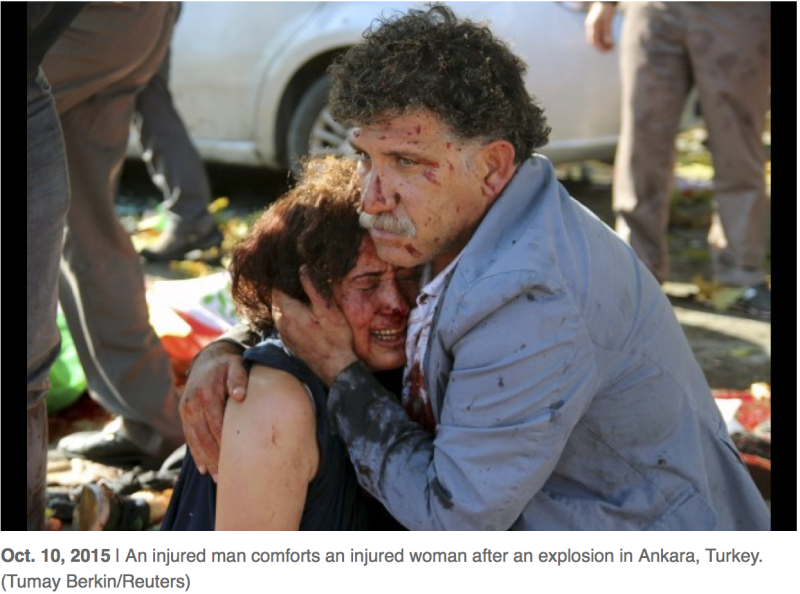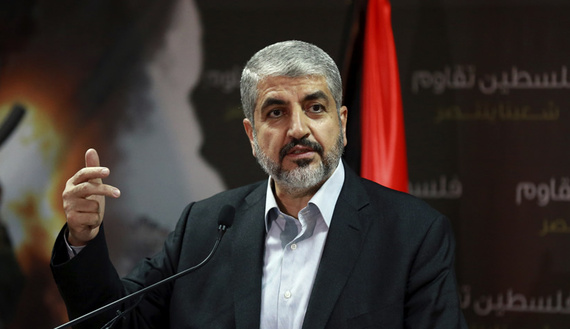Who planned the Ankara Peace Rally Bombings?
Twin simultaneous bombings ripped through a crowd of opposition supporters and Kurdish activists at an Ankara peace rally today killing 97, maiming and injuring over 246. The bombings occurred just a few weeks before a snap election scheduled for November 1st. There is suspicion that the Turkish President couldn’t have wished for a more timely mishap. It comes before an election he called to try and eliminate the Kurdish minority HDP party and return his AKP party to its previous super majority. You may recall the Suruc bombing in July that killed 33 socialist youths affiliated with the HDP that kick started the PKK uprising in southeastern Turkey. That was used as a pretext for Erdogan’s subsequent counter terrorism campaign and air assault on both Syrian Kurdish YPG and PKK bastions in northern Iraq. The better to condition the US request for Turkish clearance of the use of Incirlik air base for the flagging air assault campaign against ISIS in both Syria and Iraq. It is not without coincidence that he PKK today called for a temporary truce before the looming election. The conventional wisdom is, as in the Suruc case , that it was possibly the work of ISIS. However, there may have been other Islamist contenders for this latest terrorist spectacle in Turkey. Recall that the Muslim Brotherhood affiliate, the IHH, an ally of the AKP regime, supplied funds and weapons to opposition Islamist groups in Syria.
Watch this ReutersTV video of the Ankara Peace Rally bombings.
Our usually astute European observer of things Turkish drew attention in a conversation following the Ankara blasts that daily polls taken by Erdogan show that his standing has slipped . Thus, indicating that his quest for conversion of the currently ceremonial post of President in Turkey to an executive one with broad powers may be out of reach. Moreover, our colleague indicated that the opposition in the Ankara parliament, including Republican, Nationalist and the Kurdish HDP parties, are united against AKP supremacy. In fact, he said, the parliament is rarely convened in Ankara by the caretaker government. He also noted that when he viewed Turkish television coverage of the Ankara bombing incident there were HDP flags and banners prominent in the footage along with those of trade union groups. However, following the deadly blast, he observed that footage somehow disappeared from Turkish television news reports.
With the dramatic entry of Russia in the Syrian fray both Erdogan’s and Obama’s vain hopes for control of the situation have been eclipsed. Calls for establishment of both no-fly zones and safe havens by the Turkish and US Congressional and Presidential hopefuls appear to be wishful thinking. Russian President Putin has thrown in his lot with Iran propping up the besieged Syrian President Bashar Assad who controls less than one sixth of his country. Thus, the suspicion is today’s Peace rally bombings might not been perpetrated by PKK, known Marxist terrorist groups or ISIS. That leaves the question of whether Islamists groups allied with Erdogan and the AKP may have been complicit in the bombings? In the dictatorial regime of Erdogan with a chastened prosecution and judiciary, the answers to these questions may not emerge with any perfunctory forensic investigation by Turkish authorities.
 The Washington Post (WaPo) report described the grisly and chaotic scene following the bombings, “Blasts kill scores at peace rally in Turkey in sign of worsening instability.” Note in these excerpts how the Turkish PM Davutoglu asserts this bombing was aimed as disrupting what passes for democracy in this NATO ally and other commentators immediately suspect ISIS.
The Washington Post (WaPo) report described the grisly and chaotic scene following the bombings, “Blasts kill scores at peace rally in Turkey in sign of worsening instability.” Note in these excerpts how the Turkish PM Davutoglu asserts this bombing was aimed as disrupting what passes for democracy in this NATO ally and other commentators immediately suspect ISIS.
Turkish Prime Minister Ahmet Davutoglu said Saturday there were “strong indications” the attack was carried out by suicide bombers, although there was no immediate claim of responsibility. He said the target was Turkish unity, democracy and stability.
“Early indicators would point to ISIS as the culprit,” said Soner Cagaptay, director of the Turkish research program at the Washington Institute for Near East Policy. Either way, “this could well be Turkey’s 9/11,” Cagaptay said. “This is simply the worst terror attack in Turkish history.”
The United States also condemned the twin bombings as a terrorist attack. “It is particularly important at this time that all Turkish citizens recommit to peace and stand together against terror,” the State Department said in a statement.
The demonstrators, mobilized by a coalition of Turkish trade unions, had gathered outside Ankara’s main [train] station hours earlier to chant, wave banners and flags and call for peace. The crowd included a mix of Kurdish and leftist Turkish activists, local media reports said.
A video circulated on social media showed demonstrators linking arms to perform a traditional dance before a fiery explosion erupted in the background, sending the crowd into a panic. It was unclear whether that explosion was from the first or the second bomb detonated outside the station.
Images from the scene showed dazed and bloody demonstrators clinging to one another in the aftermath of the blasts. Bodies, some of them dismembered, lay on the street, covered with flags protesters had brought to the march.
Tensions between police and demonstrators flared following the explosions, after activists accused security forces of blocking ambulances arriving to treat the injured. Turkey’s pro-democracy activists say they are fed up with a state that is quick to crack down on dissenters but cannot keep its own citizens safe from terrorists.
In a live television broadcast, Turkish Interior Minister Selami Altinok said in response to a reporter’s question that he would not resign because there had been no security breach.
Still, Turkish authorities announced a news blackout on images showing the moment of each blast, gruesome or bloody images or “images that create a feeling of panic,” according to the Associated Press. The agency also reported that social media users in Ankara were unable to access Twitter after the blast.
Turkey, which media watchdog groups say has one of the world’s worst records on press freedom, often blocks access to Twitter and other sites for content the government deems inappropriate.
EDITORS NOTE: This column originally appeared in the New English Review. The featured image is of Turkish Peace Rally protesters dancing moments before deadly bombings in Ankara. Source: Reuters TV.


